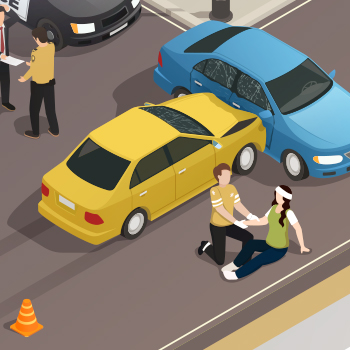
Head injuries are some of the most serious injuries caused by car accidents. These include things like cuts and bruises and life-threatening health issues such as brain injuries.
These injuries can occur in a wide variety of automobile crashes. Your head can be damaged no matter the speed of the collision or whether the head hit an object during the crash.
The car accident attorneys at Janet, Janet & Suggs have created a guide to filing a personal injury claim after suffering a car accident head injury. If you suffered a head injury in a car crash, do not hesitate to contact us for a free legal consultation to find out if we can help you.
Types of Head Injury
Head injuries occur at higher rates in side-impact automobile accidents, but also result from head-on and rear-end collisions. These injuries often occur when the head strikes objects within the car due to the impact of the accident.
Common head injuries sustained in car accidents include:
Closed Head Injuries
Concussions and other traumatic brain injuries (TBIs) occur when the force of an accident causes the brain to strike the skull as cerebrospinal fluid is displaced. Concussions and TBIs may result in the following symptoms:
- Loss of consciousness
- Cognitive disruptions
- Irritability
- Nausea
- Depression
- Sleep disturbances
If not diagnosed right away, closed head injuries can be life-threatening.
Other closed head injuries include epidural, subdural and acute hematomas, which are blood clots within the skull.
Penetrating Head Injuries
During an accident, an object can penetrate the skull and possibly enter the brain. The penetration may cause severe, life-altering consequences depending on the part of the brain impacted.
Open Head Injuries
Open head injuries are caused by force and lead to skull fracture. The brain tissue may or may not be exposed, depending on the type of fracture. Surgery may be required to treat these types of injuries.
Liability for a Car Accident Head Injury
Drivers owe other motorists a legal duty of care to take steps to keep themselves and other drivers safe. Speeding, ignoring traffic signals and reckless driving are examples of negligent acts by a driver.
When negligence on another driver’s behalf causes your accident and subsequent injury, you may be able to file a personal injury lawsuit to pursue compensation for medical bills, lost wages, and pain and suffering.
However, Massachusetts is a no-fault state, which means you cannot file a lawsuit unless your claim satisfies one of two conditions:
- Your medical expenses exceed $2,000
- You suffered a permanent or severe injury
If your claim does not meet one of those two conditions, you are required to obtain compensation from your own insurance company, regardless of who was at fault for the collision.
Gathering Evidence to Support Your Claim
In a personal injury lawsuit or insurance claim, you will need evidence to build a strong case to support the assertion that the other driver’s negligence caused your injury. Below are the types of evidence that are used to support head injury claims:
Medical Records
Seeking medical care immediately following your accident will help to support your case. Your treating physician will note that the injury was caused by the accident and not some other source. You should retain copies of all hospital and physician medical records, imaging, diagnostic test results, and prescriptions.
Also, keep copies of all your medical bills to show the monetary damages you have suffered due to the injury.
Pictures
Photographing the accident scene should be done if you are medically capable of it. Use your cellphone or camera to capture photos of the:
- Vehicles involved
- Damage to the vehicles
- Road conditions
- Damage to the roadway or surroundings
- Your injuries
Statements
Witness statements are valuable in recounting information about the accident that may have escaped you as you dealt with your injury or experienced a post-accident adrenaline rush. Write down names and contact information for any witnesses so your attorney can contact them as needed.
Police Report
Obtain a copy of the police report as well, as it often contains the responding officer’s opinions about who was at fault for the accident. The police report will also note if the other driver received a ticket for the crash.
Contact Us for a Free, No Obligation Legal Consultation
The personal injury lawyers at Janet, Janet & Suggs work to secure the compensation head injury victims deserve for their medical bills, lost wages, and pain and suffering.
If you have a viable claim, we will work to gather the needed evidence and pursue responsible parties to recover fair compensation for you.
Schedule a free, no-obligation case consultation now. We take cases on a contingency basis, so you do not owe legal fees unless you secure compensation.
Call 1-877-692-3862 or complete our Free Case Evaluation form today.
